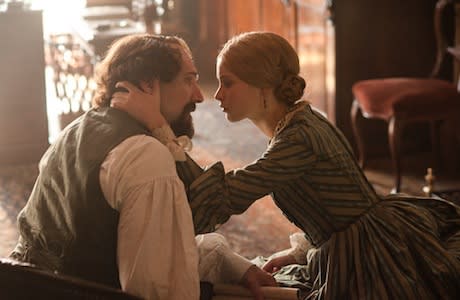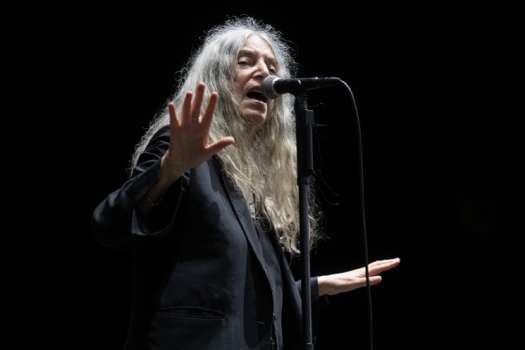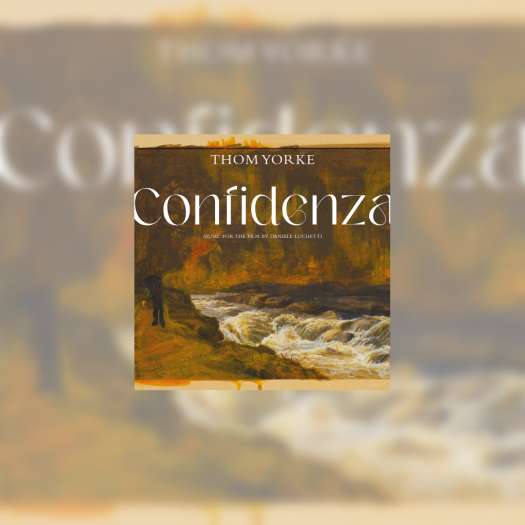As outlined in Claire Tomalin's 1990 biography, The Invisible Woman: The Story of Nelly Ternan and Charles Dickens, the titular "woman," Nelly (Felicity Jones), was an actress who had a relationship with Dickens between 1857 and 1870, playing a central role in his life at a time when he was arguably the most prominent celebrity in Britain. Though Dickens' (Ralph Fiennes) cruel public rejection of his wife, Catherine (Joanna Scanlan), was public knowledge, his secret relationship with this much younger woman was swept under the rug, with almost all recounts of their relations destroyed to help maintain his respectable image of Victorian morality.
Tomalin made it quite clear that despite painstaking research, going through old playbills and accounts, much of her biography was based on interpretation and speculation. In Ralph Fiennes's adaptation, further liberties are taken to create a sense of dramatic cohesion, focusing more on the core relationship and all things Dickens, including many references to his writings, rather than the woman herself.
Although the film starts some years after the death of the David Copperfield author, with Nelly living a new life married to a schoolmaster, her life post-Dickens is limited mostly to a children's stage production of The Frozen Deep (the play that originally brought them together) and some dramatic pacing along an empty beach. These sequences merely act as a framing device for the central romance between the pair, which has a linear progression, from playful flirtation to conflict to tragedy, following a loose trajectory of the oft-referenced Great Expectations, in futility and inevitability.
Initially, Nelly's romanticized perception of the famed author blinds her to the veiled warnings of those around her. Catherine (having long known her husband's relationship with celebrity and perpetual need for external validation) tries to contextualize the young girl's flowery projection of Dickens' identity, pointing out that his books are merely formulas meant to entertain. Nelly's mother (Kristin Scott Thomas), initially concerned about public perception and her daughter's virtue, weighs the benefits, knowing the limited prospects of an untalented, lower class actress within the context of increasing class system divides.
What's intriguing about Fiennes's interpretation is his handling of celebrity. While the many women around Dickens discuss the practicality of indulging his whims — even Nelly's eventually agreement to be his mistress seems more like a business deal than the result of a powerful connection — they're aware that their role, ultimately acquiescing to the demands of patriarchal power, is limited to discerning what might be the lesser of all evils. Dickens remains outside of the bigger discussion, knowing he'll eventually get what he wants, something that smartly isn't presented as villainous, so much as childish and selfish.
As a portrait of the omnipresent power and sense of blind entitlement we allow figures of social authority to have, The Invisible Woman excels. But where it struggles is in cohesion and understanding gender divides beyond mere conjecture.
While this tale of a woman relegated to the footnotes of history suggests a text of female empowerment, the same sort of facile handling of female characterizations that Dickens demonstrated in his literature exists in the execution of this story. Nelly is given a bit of complexity, having enough strength of character to recognize the faults in her idols, but as contextualized within the film, her life path begins and ends with her relationship with Dickens and memory of him.
Similarly, Fiennes's background as an actor is evident in his handling of direction, since his focus is always on catching lingering shots of people reacting or reciting prose, rather than capturing any sort of lyricism or emotional progression. Considering that this is intended as a commentary on celebrity worship and the historical subjugation of women, the overly showy and literal interpretations —directorial tics typically demonstrated by men — make it difficult to attribute anything particularly feminine to the film.
No matter how much the actors cry in close-up or stare wistfully off into the landscape, there's an inherent theatrical coldness to the material that doesn't allow personal connection. It's understandable, but also somewhat ironic, inadvertently reiterating the limited male understanding of, and appreciation for, women.
(Mongrel Media)Tomalin made it quite clear that despite painstaking research, going through old playbills and accounts, much of her biography was based on interpretation and speculation. In Ralph Fiennes's adaptation, further liberties are taken to create a sense of dramatic cohesion, focusing more on the core relationship and all things Dickens, including many references to his writings, rather than the woman herself.
Although the film starts some years after the death of the David Copperfield author, with Nelly living a new life married to a schoolmaster, her life post-Dickens is limited mostly to a children's stage production of The Frozen Deep (the play that originally brought them together) and some dramatic pacing along an empty beach. These sequences merely act as a framing device for the central romance between the pair, which has a linear progression, from playful flirtation to conflict to tragedy, following a loose trajectory of the oft-referenced Great Expectations, in futility and inevitability.
Initially, Nelly's romanticized perception of the famed author blinds her to the veiled warnings of those around her. Catherine (having long known her husband's relationship with celebrity and perpetual need for external validation) tries to contextualize the young girl's flowery projection of Dickens' identity, pointing out that his books are merely formulas meant to entertain. Nelly's mother (Kristin Scott Thomas), initially concerned about public perception and her daughter's virtue, weighs the benefits, knowing the limited prospects of an untalented, lower class actress within the context of increasing class system divides.
What's intriguing about Fiennes's interpretation is his handling of celebrity. While the many women around Dickens discuss the practicality of indulging his whims — even Nelly's eventually agreement to be his mistress seems more like a business deal than the result of a powerful connection — they're aware that their role, ultimately acquiescing to the demands of patriarchal power, is limited to discerning what might be the lesser of all evils. Dickens remains outside of the bigger discussion, knowing he'll eventually get what he wants, something that smartly isn't presented as villainous, so much as childish and selfish.
As a portrait of the omnipresent power and sense of blind entitlement we allow figures of social authority to have, The Invisible Woman excels. But where it struggles is in cohesion and understanding gender divides beyond mere conjecture.
While this tale of a woman relegated to the footnotes of history suggests a text of female empowerment, the same sort of facile handling of female characterizations that Dickens demonstrated in his literature exists in the execution of this story. Nelly is given a bit of complexity, having enough strength of character to recognize the faults in her idols, but as contextualized within the film, her life path begins and ends with her relationship with Dickens and memory of him.
Similarly, Fiennes's background as an actor is evident in his handling of direction, since his focus is always on catching lingering shots of people reacting or reciting prose, rather than capturing any sort of lyricism or emotional progression. Considering that this is intended as a commentary on celebrity worship and the historical subjugation of women, the overly showy and literal interpretations —directorial tics typically demonstrated by men — make it difficult to attribute anything particularly feminine to the film.
No matter how much the actors cry in close-up or stare wistfully off into the landscape, there's an inherent theatrical coldness to the material that doesn't allow personal connection. It's understandable, but also somewhat ironic, inadvertently reiterating the limited male understanding of, and appreciation for, women.




